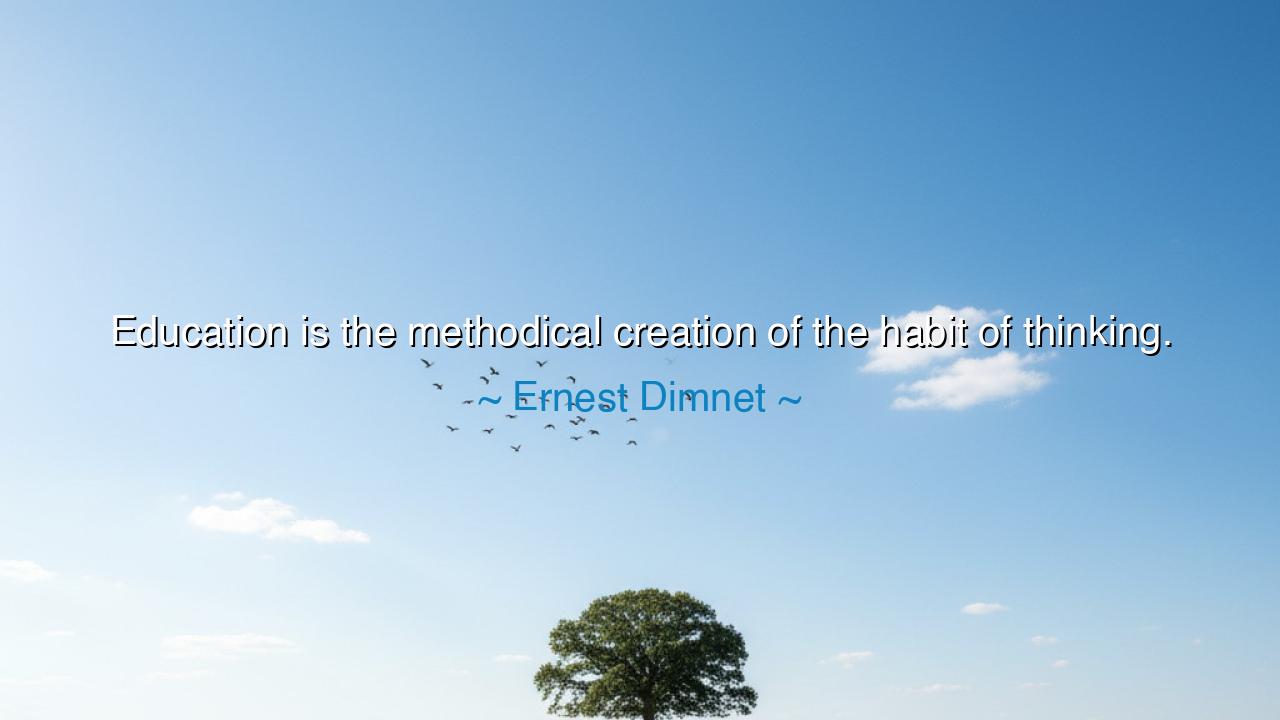
Education is the methodical creation of the habit of thinking.






The words of Ernest Dimnet—“Education is the methodical creation of the habit of thinking.”—resound like a timeless bell tolling across the ages. In them lies a truth so simple yet so profound: that the essence of education is not the mere memorization of facts, nor the blind repetition of lessons, but the cultivation of a living, breathing power—the power to think. Dimnet, a French priest, writer, and philosopher of the early twentieth century, saw with clarity that knowledge without thought is like water poured into a leaky vessel: it does not remain, nor does it nourish. But when education teaches the mind how to think, it forges habits that endure beyond school and echo through a lifetime.
To describe education as a methodical creation is to remind us that the growth of the mind is no accident. Just as the blacksmith tempers iron through fire and hammer, so too must the mind be tempered by discipline, curiosity, and practice. The habit of thinking does not appear fully formed; it must be crafted with patience. Dimnet’s choice of words—methodical, creation, habit—reveal that education is both art and science: structured enough to guide, yet creative enough to awaken the spirit.
What is this habit of thinking? It is the discipline to question before accepting, to analyze before concluding, to see beyond appearances and into the heart of truth. It is the refusal to be swayed by empty rhetoric, the courage to doubt, and the joy of discovery. History shows us that civilizations thrive when their people cultivate this habit. Ancient Greece gave us philosophy because it taught citizens to ask, “What is justice? What is truth?” The Renaissance flourished because scholars dared to think differently, questioning authority and returning to the sources of wisdom. The habit of thinking is no luxury—it is the seedbed of progress and freedom.
Consider the story of Socrates, who walked the streets of Athens not with answers but with questions. His methodical conversations, now called the Socratic method, trained his listeners not to accept ideas blindly but to examine them, to challenge assumptions, to think. Though condemned by the city for corrupting the youth, Socrates left a legacy that has endured for millennia. His life illustrates Dimnet’s teaching: that true education is not about stuffing the mind with data but about creating the habit of thinking, a habit that no authority can suppress.
Dimnet’s words also serve as a warning. For in many places, education is reduced to rote memorization, to preparing for tests rather than preparing for life. Students recite but do not reflect, absorb but do not analyze. Such learning creates not thinkers but parrots, and societies that produce parrots cannot endure the storms of history. Tyrants thrive when people do not think; demagogues rise when citizens fail to question. The habit of thinking is thus not only a personal gift but a safeguard for liberty.
The lesson is clear: seek in your own life to cultivate this habit. Read not only to remember, but to question. Listen not only to hear, but to weigh and reflect. Ask yourself: “Why is this so? What does it mean? What lies beneath?” Practice thinking as one practices music or sport—daily, patiently, methodically—until it becomes second nature. For in this habit lies freedom, creativity, and strength of character.
So, O seeker, carry Dimnet’s wisdom with you. Education is not the end of thought but its beginning. Schools may give you knowledge, but it is your task to turn that knowledge into understanding by the power of reflection. Be methodical in shaping your mind, and let the habit of thinking become your constant companion. For when you learn not just what to think, but how to think, you hold in your hands the truest fruit of education, and no power on earth can take it from you.






AAdministratorAdministrator
Welcome, honored guests. Please leave a comment, we will respond soon